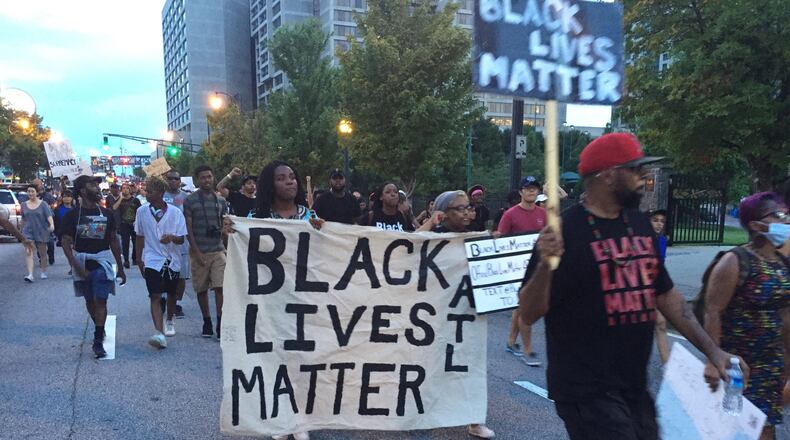The unanswered question for Atlanta Police chief George Turner: When will the protests end?
As hundreds of demonstrators gathered Sunday for a fourth consecutive night in downtown Atlanta, Turner worried about the impact relentless heat and stress is having on his officers as they work 12 hour shifts trying to keep safe the public and the protesters.
“They’ve been in the heat so long we don’t want them to lose their cool,” he said.
Turner's force has been widely praised for its levelheaded response to a massive march Saturday night where some 10,000 people railed against police shootings in far off Louisiana and Minnesota.
The chief’s comments Sunday came as a legendary Atlanta civil rights leader had sharp words for the latest wave of protests.
“Those are some unlovable little brats out there some times,” Andrew Young told Atlanta police officers in a pep talk. “Don’t let anybody get you upset.”
The former Atlanta mayor, a leader on the frontlines of the 1960s battle for civil rights, said that today’s protesters have gathered “not even with a clear message.”
Young, the 84-year-old former U.S. ambassador, volunteered to talk to a couple dozen officers at a southwest precinct. He did so after Turner texted him a request for prayers. The two have a long history. Turner was assigned to protect Young 30 years ago and Young became a mentor to the future chief.
“These kids are able to show off with no consequences. I just hope they get tired of it,” Young said Sunday. He worried that they will hurt Atlanta’s economic gains and “mess up the climate we have taken 50 years to build.”
On Sunday, hundreds of demonstrators crowded the streets of downtown Atlanta again calling for an end to police brutality. And like the previous three nights, a splinter group of protesters roamed the streets of downtown, blocking traffic, chanting, dancing and sometimes confronting officers.
Kevin Hairston was among them. The Fayetteville man said he sympathizes with weary police, to a point.
“I understand they are getting tired, but we are getting tired as well,” Hairston said. “They need to step up and do something about it as well.”
Hairston a U.S. Army veteran, carried a homemade sign that says “I Served. Don’t Shoot.” He glued to his sign photos of his six children, ages six months to six years old.
“I’m just thinking that if I get pulled over one day, what is going to happen to me and who is going to be there to raise my kids?” he said.
A local NAACP leader - who has organized two of the gatherings - said he expects they will continue.
“It’s important that people continue to express their outrage at the continued white supremacist attitudes,” Richard Rose, the president of the NAACP’s Atlanta branch, Rose said, including some that continue in Atlanta.
“Whatever it takes to make a difference with the political structure to make them understand they should address the fears of these protesters.”
Rose, who is 67, said as a boy who took part in civil rights protests in Memphis in the 1960s. Even then, he said, people within the civil rights movement disagreed about tactics.
It’s true, he said, that many recent protesters in Atlanta don’t have a clear plan on what specific actions officials should take. “They are frustrated. They don’t know what to do.”
But he said Atlanta Mayor Kasim Reed and the chief of police should meet with him and other civil rights leaders to talk about steps to take to reduce “white supremacist attitudes” that still exist within the police force.
Rose suggested, for example, that every officer undergo periodic mental evaluations “to see if they are suited for the responsibility and the power they have and to determine if they are bigots.”
Reed spokeswoman Anne Torres said late Sunday that the mayor, “hasn’t heard from Mr. Rose, but is open to hearing his suggestions.”
“Over the last three days, the administration has been focused on the safety and security of protesters and officers.,” Torres said in an e-mailed statement. “Over the coming days and weeks, we will take steps to continue this conversation with important community voices, including civil rights leaders.”
But Turner, the chief, wonders how long it will stay that way. He said officers had done “an amazing job” in dealing with protesters and he doesn’t want that to change as protests continue.
While he said he wants the protests to stop, he said he doesn’t plan to change police tactics that have allowed protesters to walk in streets undeterred, so long as they don’t cause property damage or attempt to gather on interstates.
Asked what he would rather protesters do to vent their frustrations, Turner said, “I wish I knew.”
About the Author
Keep Reading
The Latest
Featured



